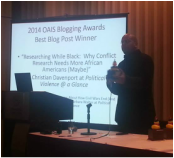Images from the Thomas Hobbes' Leviathan
So, in that spirit, I wish to remind us that: we are political science. What are we waiting for?
I charge the discipline with killing creativity. The first draft of my papers are way more interesting than what inevitably is published after nit-picky comments about my not citing who they think I should cite. If the cited work does not transform the piece, then forget it.
Actually, since many people don't seem to want to read what has actually been written before, I think that all citations should be removed from submitted articles. Reviewers and/or editors should then be challenged to see if they can find a citation that already did what the author came up with or which is simply just a better piece in terms of quality (i.e., it predicts more, it has uses a more flexible estimator that allows for varied functional forms). If the piece is derivative, then it is rejected. No long review: just a single citation. Now wouldn't that be refreshing as well as helpful?
I charge the associations with turning into profit-seeking institutions that are killing fun and I charge us (the consumers/users) with being complicit with that development. The mantra that bigger is better is undermining community and communication. We now go to conferences for vacations and seeing friends in between often mind-numbing speed sessions as opposed to the deep engagement with a topic accompanied by like minded individuals resulting in transformative insight.
In short, annual meetings of APSA and Midwest are not the Peace Science meeting (perhaps my favorite). Perhaps they never were but they should be. Equally important: they can be because: we are political science.
It all started for me a few years ago being frustrated with putting in hours to review 6 people's papers and having about 12 minutes to discuss them. This followed 7 minute blitz presentations of the presenters and 2 3/4 questions from the audience. I gave the authors written comments, which was great dyadically, but the community was not informed, engaged or entertained. We were left like individuals who came to hear a 4-5 hour concert by the late/great Leonard Cohen but heard 43 minutes of David Hasselhoff. I don't know about you but I want the first experience (I did like Knightrider though).
So on this occasion I suggested to folks that we meet later on Skype or Google hangout or Blue Jeans to continue the conversation that got started in that room. We e-met and talked and partially got there (some of the conference momentum was lost and if we had had a session within a week of the conference that would have been better). It was a start though and much closer to Cohen.
I'm also seeing younger folks being somewhat disenchanted with the profession saying that they are not sure it has a heart (in the Castaneda kind of way: they are not sure that it is worth putting in the time because of what they think they see practitioners doing).
But this is not true. There is a heart to be found. I would remind them that: we are political science. We have amazing latitude to create the world and profession that we live within. I would remind them that what they see in their department is not how all people/departments do it - the younger folks see a fraction of what can be in part because faculty do not always show them what lay behind the curtain and how we spend our time (I mean all of it).
Toward that end, I have seen professors bring onto campus political revolutionaries to talk to students about what they have seen in the world and why they do what they do (a Sandinista at Clark University). I have seen professors bring onto campus political reactionaries to do the same (one of the people that participated in the Watergate break in under President Nixon). Although disagreeing with everything said, this lecture/performance went on for about 4-5 hours and to this day sits as one of the most fascinating displays of argumentation and energy I have experienced.
I have seen professors work to bring about social change around the world through advising activists, advocates and ordinary citizens. I have also seen professors help destroy such efforts through advising governments on who to watch, who to arrest and possibly who to eliminate. Both of these happened most clearly when I was at the University of Maryland at the same time. I also saw much of the former while I was at the University of Notre Dame.
I have seen people make connections between distinct units on campus (e.g., architecture, the medical school, music and sociology) that pushed the boundaries of each and which made all feel a little bit more alive. Edutainment at its best. This is happening at the University of Michigan (where I am currently) and Arizona State University (where I have a large number of friends and associates).
It's clearly not all good. Not all are on the same paths. At the University of Houston, I recall after the fall of the Soviet Union colleagues unwilling and unable to adjust to the new reality - quickly retiring. While at some European meeting I recall someone making the claim that a piece was not really "legitimate" until it appeared in a peer reviewed journal 1-3 years after it was created (mostly unchanged except for some citations). Is that the best we can do? Heck, is that even accurate? Was Collier and Hoeffler's working paper on civil war ever published? If so, which version did you read?
Also, what ever happened to being wrong? Was there a "third wave" of democratization or not? Huntington really didn't have any detailed analysis. I recall a piece that appeared in World Politics that was quite decent saying that there was no third wave - it was something quite different. If so, then what of all the people that talked about it? Do they know that Huntington was off? While we are here: how did the "clash of civilizations" stand up to evidence? Was dependency theory wrong? I don't recall any good study that refuted it. Where is the institution that follows how accurate bloggers are (i.e., a rate your blogger dot come)? If someone is constantly incorrect, why do they keep talking and why do we keep listening?
We don't need to leave it this way though - none of it. We can fix this and fashion a better way forward. You know why? Yeah, say it with me: because we are political science!



 RSS Feed
RSS Feed
